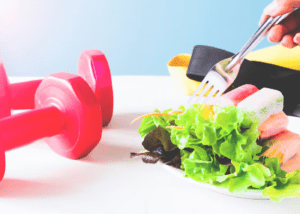Muscle building on a vegan diet is impossible-sounding, but it’s possible! With the proper plan, you can gain size and strength without animal foods. Many athletes are showing that a plant-based diet can be utilized to build muscle, recover, and become healthier. If you’re keen to muscle build on a vegan diet, you’re on the right page. This article will walk you through a vegan diet plan for building muscle, including popular tips for best results.

Why Go Vegan for Muscle Building?
Going vegan has numerous benefits beyond muscle building. Plant-based diets are packed with nutrients for overall health. They are rich in fiber, vitamins, and antioxidants with less saturated fat.
Athletes are also employing plant-based diets for faster recovery and endurance. With the proper foods, you can achieve your muscle-building goal without compromising key nutrients.
Key Nutrients for Muscle Building on a Vegan Diet
When planning a vegan diet plan for muscle building, you must focus on a few key nutrients:
Protein
Protein is used to repair and build muscles. As a vegan, you’ll need to get your protein from foods that are plant-based such as:
- Lentils
- Chickpeas
- Tofu
- Tempeh
- Seitan
- Quinoa
- Plant-based protein powders
Healthy Fats
Saturated fats are used in hormone synthesis and energy. Utilize these plant-based sources of fats:
- Avocado
- Nuts and seeds (almonds, chia seeds, flaxseeds)
- Olive oil
- Coconut oil
Carbohydrates
Carbs provide energy for your workout and restore glycogen stores. Utilize whole, unprocessed carbs such as:
- Sweet potatoes
- Brown rice
- Quinoa
- Oats
- Whole wheat bread and pasta
Vitamins and Minerals
A vegan diet can lack nutrients such as vitamin B12, iron, and omega-3s. Here’s how to bypass those needs:
- B12: Utilize a supplement or consume fortified foods
- Iron: Just like leafy greens, legumes, and seeds
- Omega-3s: Chia seeds, flaxseeds, walnuts, or vegan omega-3 supplement
Vegan Muscle Building Diet Plan (Sample Meal Plan)
Here is a quick, day-long vegan meal plan tailored to assist you in building muscles:
Breakfast: High-Protein Smoothie Bowl
- 1 cup almond milk
- 1 scoop plant-based protein powder
- 1 banana
- 1 tablespoon peanut butter
- 1 tablespoon chia seeds
- Handful of spinach
Combine everything and top with fresh berries, granola, and a sprinkle of hemp seeds.
Snack: Hummus and Veggies with Whole Grain Crackers
- 1/2 cup hummus
- Carrot sticks, cucumber, and bell pepper slices
- Whole grain crackers or rice cakes
Lunch: Quinoa and Chickpea Bowl
- 1 cup cooked quinoa
- 1/2 cup chickpeas
- Roasted sweet potatoes
- Steamed broccoli
- Tahini dressing
Post-Workout Snack: Protein Shake
- 1 scoop plant-based protein powder
- 1 cup oat milk
- 1 tablespoon almond butter
Dinner: Tofu Stir-Fry with Brown Rice
- 1 cup brown rice
- 1 block tofu (pan-fried or baked)
- Mixed vegetables (broccoli, bell peppers, carrots)
- Soy sauce and sesame seeds for flavor
Before Bed: Almond Butter and Berries
- 1 tablespoon almond butter
- 1/2 cup fresh berries
Trending Tips for Maximizing Muscle Gains on a Vegan Diet
1. Track Your Protein Intake
Make sure you’re getting enough protein each day. Try to eat about 1.6 to 2.2 grams of protein for every kilogram of your body weight. Use apps such as MyFitnessPal to track your meals.
2. Use Plant-Based Protein Powders
It’s an easy way to boost your protein intake. Use powders with pea, rice, or hemp protein.
3. Meal Prep for Success
Meal prepping ensures you are getting the nutrients you require. Bake meals in bulk to save time and maintain the momentum.
4. Focus on Strength Training
Pair your vegan diet with a good strength-training routine. Adhere to compound exercises such as squats, deadlifts, and bench presses to build muscle with efficiency.
5. Stay Consistent and Be Patient
It is not quick or easy to gain muscle, vegan or otherwise. Be patient, stay consistent, and make changes.
Mistakes to Avoid
1. Not Eating Enough Calories
Muscle gain requires a calorie surplus. Make sure you are taking in enough calories to fuel workouts and recovery.
2. Too Much Relying on Processed Foods
Being vegan does not equal being healthy. Keep your attention on whole, plant foods for the best results.
3. Missing Supplements
Some sources of nutrients are hard to get from a vegan diet alone. Make sure you include supplements like vitamin B12, iron, and omega-3s.
Last Words
Vegan muscle gain is not only possible but highly rewarding. With attention to whole, nutrient-rich foods and a well-structured routine, you can reach your fitness goals. Keep your attention on protein, healthy fats, and carbs, and supplement as needed. Stay consistent, track progress, and enjoy your journey to strength on a plant-based diet!
